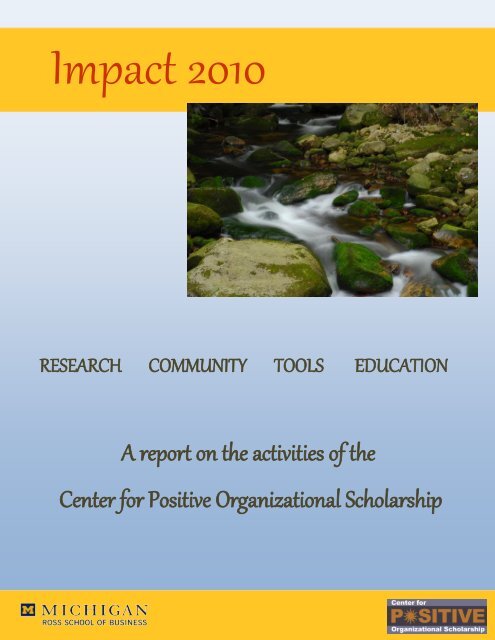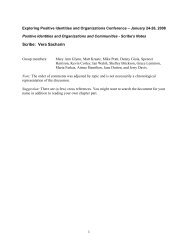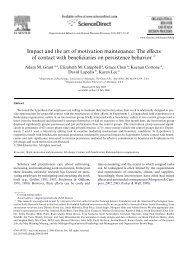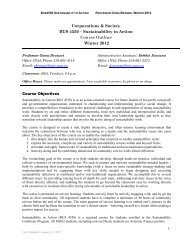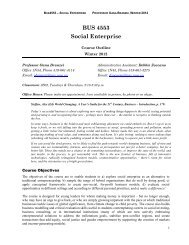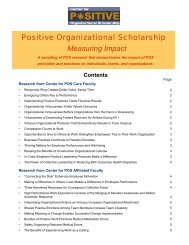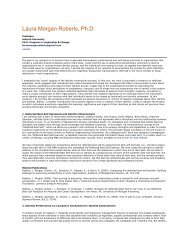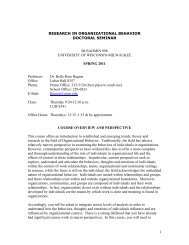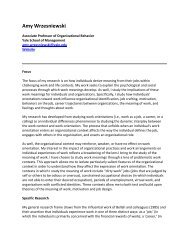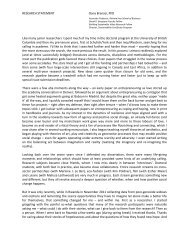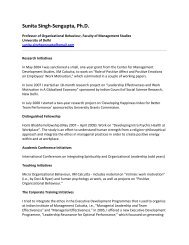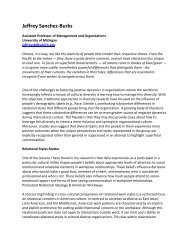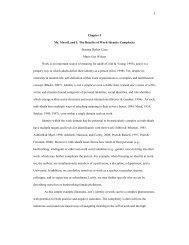CPOS Report 2010 - Center for Positive Organizational Scholarship
CPOS Report 2010 - Center for Positive Organizational Scholarship
CPOS Report 2010 - Center for Positive Organizational Scholarship
Create successful ePaper yourself
Turn your PDF publications into a flip-book with our unique Google optimized e-Paper software.
Impact <strong>2010</strong><br />
RESEARCH COMMUNITY TOOLS EDUCATION<br />
A report on the activities of the<br />
<strong>Center</strong> <strong>for</strong> <strong>Positive</strong> <strong>Organizational</strong> <strong>Scholarship</strong><br />
1
© 2011 Regents of the University of Michigan
<strong>Center</strong> <strong>for</strong> <strong>Positive</strong> <strong>Organizational</strong> <strong>Scholarship</strong><br />
Stephen M. Ross School of Business<br />
University of Michigan<br />
701 Tappan Avenue<br />
Ann Arbor, Michigan 48109-1234<br />
Tel 734.647.8154 Fax 734.936.6631<br />
May www.center<strong>for</strong>pos.org<br />
16, 2011<br />
May 16, 2011<br />
Dear Friends and Colleagues,<br />
―New energy‖ was the hallmark of <strong>2010</strong> <strong>for</strong> the <strong>Center</strong> <strong>for</strong> <strong>Positive</strong> <strong>Organizational</strong> <strong>Scholarship</strong><br />
(POS). We welcomed Dave Mayer, a new faculty member in the Management and<br />
Organizations area; his research on a positive approach to ethics has enriched our activities, and<br />
significantly contributes to the research capability of the <strong>Center</strong>. We had an outstanding year of<br />
new research generated by <strong>Center</strong> faculty and doctoral students. We were reinvigorated by<br />
winning the Martin Trailblazer Award (see page 9) from the Academy of Management. This<br />
validation of our work in building the field of positive organizational scholarship was extremely<br />
gratifying.<br />
In Spring <strong>2010</strong>, the catch phrase was, ―We are building the bridge as we walk on it,‖ as we<br />
designed and implemented a pilot program <strong>for</strong> a summer action learning project <strong>for</strong><br />
undergraduates at the Ross School. We wanted to answer the question, ―Could POS ideas infuse<br />
new insights into how to approach consulting and engage in action learning?‖ Students<br />
trans<strong>for</strong>med by the program, and companies who hosted student teams, provided the<br />
overwhelmingly positive answer.<br />
We were also energized by a remarkable increase in interest in POS from Ross MBA and BBA<br />
students— in our <strong>Positive</strong> Links speaker series, <strong>for</strong> example, the audience expanded from<br />
practitioners and academics to include more students, as well as HR professionals from across<br />
the University.<br />
We look <strong>for</strong>ward to the energy building as we continue to make <strong>Positive</strong> <strong>Organizational</strong><br />
<strong>Scholarship</strong> a strength of the Ross School of Business.<br />
Sincerely,<br />
Jane E. Dutton Lynn Wooten<br />
Co-Director Co-Director
Table of Contents<br />
EXECUTIVE SUMMARY ......................................................................................................................................... 1<br />
PEOPLE ....................................................................................................................................................................... 2<br />
Core Faculty ........................................................................................................................................................ 2<br />
Post-Doctoral Fellow ........................................................................................................................................... 4<br />
Affiliates ............................................................................................................................................................... 4<br />
Staff ...................................................................................................................................................................... 5<br />
FUNDING .................................................................................................................................................................... 6<br />
ACTIVITIES ................................................................................................................................................................ 7<br />
FOSTERING RESEARCH AND COMMUNITY ................................................................................................................. 7<br />
Conferences Co-Sponsored .................................................................................................................................. 7<br />
Conferences Attended .......................................................................................................................................... 7<br />
Award Given ........................................................................................................................................................ 8<br />
Award Received.................................................................................................................................................... 9<br />
<strong>Positive</strong> Links Speaker Series ............................................................................................................................. 10<br />
POS Research Incubator .................................................................................................................................... 12<br />
Website ............................................................................................................................................................... 13<br />
Newsletter .......................................................................................................................................................... 13<br />
EDUCATION ............................................................................................................................................................. 14<br />
Ross School of Business Executive Education ................................................................................................... 14<br />
In the University Classroom ............................................................................................................................... 14<br />
FACULTY RESEARCH ............................................................................................................................................... 16<br />
Articles and Chapters ......................................................................................................................................... 16<br />
Books .................................................................................................................................................................. 18<br />
Working Papers.................................................................................................................................................. 18<br />
Presentations ...................................................................................................................................................... 19<br />
Funded Projects ................................................................................................................................................. 19<br />
TEACHING AND PRACTICE MATERIALS .................................................................................................................... 20<br />
Teaching Case .................................................................................................................................................... 20<br />
Teaching Tool .................................................................................................................................................... 20<br />
SUPPLEMENT: ALL TEACHING AND PRACTICE MATERIALS<br />
i
Mission<br />
The <strong>Center</strong> <strong>for</strong> POS is a community of scholars<br />
devoted to energizing and trans<strong>for</strong>ming<br />
organizations through research on the theory and<br />
practice of positive organizing and leadership.<br />
We are passionately dedicated to the development<br />
and dissemination of POS research. The <strong>Center</strong>’s<br />
main functions include fostering research and<br />
building the community of POS researchers<br />
worldwide; teaching POS principles; engaging in<br />
research, and publishing and presenting results;<br />
and producing teaching cases and other materials<br />
that exemplify POS principles.<br />
Activities and Research<br />
In <strong>2010</strong>, competition <strong>for</strong> the <strong>Center</strong>’s bi-annual<br />
Award <strong>for</strong> Best Paper in <strong>Positive</strong> <strong>Organizational</strong><br />
<strong>Scholarship</strong> brought 20 outstanding submissions;<br />
Stuart Bunderson and Jeffery Thompson shared<br />
the award <strong>for</strong> their paper on meaningful work.<br />
The <strong>Center</strong> co-sponsored a book-building<br />
conference at Boston University; it yielded Using<br />
a <strong>Positive</strong> Lens to Explore Social Change and<br />
Organizations: Building a Theoretical and<br />
Research Foundation, edited by Karen Golden-<br />
Biddle and Jane Dutton (Routledge, 2012).<br />
In August of <strong>2010</strong>, <strong>Center</strong> faculty members were<br />
a vital presence at the Academy of Management<br />
(AOM) Annual Meeting, and hosted a packed<br />
Gathering of POS Scholars. <strong>Center</strong> faculty<br />
members were gratified to be awarded the Joanne<br />
Martin Trailblazer Award by the Organization<br />
and Management Theory Division of AOM.<br />
The <strong>Center</strong> continued to foster the dissemination<br />
of POS research through regular events at the<br />
Ross School. The <strong>Positive</strong> Links speaker series<br />
presented five prominent researchers and<br />
innovative thinkers from around North America,<br />
and there were 10 sessions of the POS Research<br />
Incubator, which is an intimate <strong>for</strong>um <strong>for</strong><br />
discussions of evolving research.<br />
In Summer <strong>2010</strong>, <strong>Center</strong> faculty members piloted<br />
a new program with undergraduates to see if POS<br />
Executive Summary<br />
1<br />
ideas would infuse new insights into how to<br />
approach. The highly-successful program was<br />
institutionalized as a BBA class. <strong>Positive</strong><br />
Leadership programs continue to be a highlight of<br />
Ross Executive Education, and POS components<br />
are part of a number of University classes.<br />
In <strong>2010</strong>, <strong>Center</strong> faculty published nine articles<br />
and chapters on POS topics, and had more than<br />
two dozen papers in press. The books<br />
<strong>Organizational</strong> Effectiveness by Kim Cameron<br />
and Leading under Pressure: From Surviving to<br />
Thriving Be<strong>for</strong>e, During, and After a Crisis by<br />
Erika James and Lynn Wooten were both<br />
published, and three more books are in press.<br />
Kim Cameron and Gretchen Spreitzer<br />
continued to shepherd The Ox<strong>for</strong>d Handbook of<br />
<strong>Positive</strong> <strong>Organizational</strong> <strong>Scholarship</strong> towards its<br />
Fall 2011 publication; it features 79 chapters by<br />
top POS scholars. The <strong>Center</strong> released a new<br />
teaching case, Open Book Finance, and a revised<br />
edition of the Job Crafting Exercise. In Fall<br />
<strong>2010</strong>, we launched Insight | Inspiration | Impact,<br />
our electronic newsletter.<br />
People<br />
In <strong>2010</strong>, David Mayer, Assistant Professor of<br />
Management and Organizations, joined the<br />
<strong>Center</strong>; his research focuses on social and ethical<br />
issues in organizations. Emily Plews joined us as<br />
a knowledge products consultant and, as a recent<br />
Ross MBA graduate, has been a great liaison with<br />
the student community at Ross. The <strong>Center</strong>’s first<br />
post-doctoral fellow, Brad Owens, continued at<br />
Humana, Inc., on a variety of research projects.<br />
Financial Support<br />
The year <strong>2010</strong> saw continued funding from a<br />
variety of sources. The Dean’s Office of the<br />
Stephen M. Ross School of Business contributed<br />
to the <strong>Center</strong>’s operating budget; Humana, Inc.,<br />
funded a post-doctoral fellowship and made an<br />
additional expendable gift to the <strong>Center</strong>. Gifts<br />
from Ross School of Business alumnus Paul F.<br />
Jones (MBA 1975) funded our <strong>Positive</strong> Links<br />
speaker series.
Core Faculty<br />
Wayne Baker<br />
People<br />
Robert P. Thome Professor of Business; Professor of Management &<br />
Organizations; Professor of Sociology<br />
Wayne Baker’s research on positive organizational scholarship (POS) began with an<br />
interest in how POS could be applied to network analysis and social capital. His POSrelated<br />
research foci include (1) energy networks in organizations, (2) positive social<br />
capital and generalized reciprocity, and (3) values, religion, and spirituality. One of his<br />
most recent books is Achieving Success through Social Capital (Jossey-Bass 2000).<br />
Wayne’s disciplinary training in sociology keeps him focused on expanding POS<br />
beyond its psychological roots to a sociological approach to POS.<br />
Kim S. Cameron<br />
William Russell Kelly Chair of Management and Organizations; Professor of<br />
Higher Education<br />
Kim Cameron became interested in positive organizational scholarship as a result of a<br />
decade of studying the consequences of organizational downsizing. Organizations<br />
characterized by virtuous practices—e.g., <strong>for</strong>giveness, compassion, integrity, trust,<br />
optimism, kindness—tended to avoid the declining per<strong>for</strong>mance associated with<br />
downsizing. Observing this effect led to a variety of empirical studies on the<br />
relationships between organizational virtuousness and organizational per<strong>for</strong>mance.<br />
<strong>Report</strong>s of the work have appeared in a variety of books—e.g., <strong>Positive</strong> <strong>Organizational</strong><br />
<strong>Scholarship</strong> (Berrett-Koehler 2003), and Making the Impossible Possible (Berrett-<br />
Koehler 2006)—and in academic journals and book chapters. The Ox<strong>for</strong>d Handbook of<br />
<strong>Positive</strong> <strong>Organizational</strong> <strong>Scholarship</strong>, which he is co-editing with Gretchen Spreitzer,<br />
will be published in Fall 2011.<br />
Jane E. Dutton<br />
Robert L. Kahn Distinguished University Professor of Business<br />
Administration and Psychology<br />
Jane Dutton's research on positive organizational scholarship began with an interest in<br />
compassion and the difference it makes <strong>for</strong> individuals and organizations. Her<br />
research has expanded to focus on the power of positive relationships at work, positive<br />
identities and meaning, job crafting, and resilience. Her recent books include<br />
Exploring <strong>Positive</strong> Identities and Organizations (Routledge 2009), Exploring <strong>Positive</strong><br />
Relationships and Organizations (Lawrence Erlbaum 2007), and <strong>Positive</strong><br />
<strong>Organizational</strong> <strong>Scholarship</strong> (Berrett-Koehler 2003). Jane’s background in strategic<br />
management keeps her focused on how positive dynamics create sustainable<br />
capabilities in organizations.<br />
2
David M. Mayer<br />
Assistant Professor of Management & Organizations<br />
Dave Mayer is interested in the connection between ethics and POS. His research<br />
focuses on how organization’s can create environments that promote positive behavior.<br />
Much of his research examines how aspects of the work context (e.g., leadership,<br />
peers, climate) impact employees’ displays of ethical and prosocial behavior.<br />
Robert E. Quinn<br />
Margaret Elliott Tracy Collegiate Professor in Business Administration;<br />
Professor of Management and Organizations<br />
Robert E. Quinn is interested in the process of positive change. He seeks to understand<br />
processes that lead to increased individual and collective capacity. His recent books<br />
include Lift: Becoming a <strong>Positive</strong> Force in any Situation (Berrett-Koehler 2009) and<br />
Diagnosing and Changing <strong>Organizational</strong> Culture (Jossey-Bass 2006). He combines<br />
both a research and an applied orientation. He has 25 years of experience in working<br />
with executives on issues of organizational change. He teaches in both the MBA and<br />
Executive Education programs at the University of Michigan and is known <strong>for</strong><br />
innovative instructional ef<strong>for</strong>ts.<br />
Gretchen M. Spreitzer<br />
Professor of Management and Organizations; Chair of Management and<br />
Organizations<br />
Gretchen Spreitzer's research focuses on employee empowerment and leadership<br />
development, particularly within a context of organizational change and decline. Her<br />
most recent work is looking at positive deviance and how organizations enable<br />
employees to thrive and become their best selves. Most recently she is involved in a<br />
large-scale project to validate a measure of thriving at work and better understand<br />
strategies employees can use to regulate their subjective and physiological energy. Her<br />
books include A Company of Leaders (Jossey-Bass 2001). The Ox<strong>for</strong>d Handbook of<br />
<strong>Positive</strong> <strong>Organizational</strong> <strong>Scholarship</strong>, which she is co-editing with Kim<br />
Cameron, will be published in Fall 2011.<br />
Lynn Perry Wooten<br />
Clinical Associate Professor of Strategy and Management & Organizations<br />
Lynn Wooten’s interest in positive organizational scholarship (POS) began during her<br />
dissertation research; she studied the strategic management practices of professional<br />
service firms, and results indicated that humanistic work cultures were not only an<br />
efficient mode of organizing, but also resulted in higher levels of client service and<br />
human resource management capabilities. Currently, her POS-related research<br />
explores three areas: (1) positive organizing routines; (2) diversity management; and<br />
(3) crisis leadership through resilience and organizational learning. She wrote Leading<br />
Under Pressure: From Surviving to Thriving Be<strong>for</strong>e, During, and After a Crisis (<strong>2010</strong>)<br />
with Erika H. James.<br />
3
Post-Doctoral Fellow<br />
Affiliates<br />
Bradley P. Owens<br />
Bradley P. Owens’s interest in positive organizational scholarship (POS) centers on<br />
the topics of humility, energy, and positive work identities. His current research<br />
explores how humility influences individual per<strong>for</strong>mance, per<strong>for</strong>mance improvement,<br />
team processes, and leadership effectiveness. He is also currently working with other<br />
POS scholars in examining positive identities, thriving, and energy at work. He joined<br />
the <strong>Center</strong> <strong>for</strong> POS as a post-doctoral fellow in Spring 2009, funded by a generous gift<br />
from Humana, Inc.<br />
Laura Morgan Roberts<br />
Laura Morgan Roberts is a faculty affiliate of the <strong>Center</strong> and is Professor of<br />
Psychology, Culture, and Organization Studies at Antioch University. Her research<br />
focuses on how to construct, sustain, and restore positive identities at work. She<br />
became interested in positive organizational scholarship through her doctoral<br />
dissertation research on social identity-based impression management among medical<br />
professionals. Her interests in the social construction of positive identities now<br />
include: the reflected best self, diversity, authenticity, strengths, leadership, and talent<br />
management.<br />
Shawn Quinn<br />
Shawn Quinn teaches courses on leadership, change, and innovation in the Ross<br />
Executive Education <strong>Positive</strong> Leadership programs. He is the Managing Partner <strong>for</strong><br />
LIFT Consulting, and specializes in working with organizations interested in applying<br />
positive organizing concepts. His clients include General Electric, Coca Cola, O2,<br />
American Express, Reuters, the U.S. Army, and Telefonica. Shawn has also helped<br />
develop and run the Competing Values Assessment with over 100 teams and<br />
organizations. He is the co-author of Leading Innovation: How to Jumpstart Your<br />
Organization’s Growth Engine (McGraw-Hill, 2006).<br />
4
Staff<br />
Janet Max<br />
Janet Max manages public relations, event planning, finances, and contract<br />
negotiations <strong>for</strong> the <strong>Center</strong>. She builds relationships <strong>for</strong> the <strong>Center</strong> with various<br />
University units, represents the <strong>Center</strong> at conferences, and writes and edits reports, the<br />
newsletter, and website content. She organizes events including the <strong>Positive</strong> Links<br />
speaker series and the biannual conference of POS scholars. She prepares and manages<br />
the <strong>Center</strong> budget and manages contract negotiations with collaborators and donors.<br />
Emily Plews<br />
Emily Plews's interest in positive organizational scholarship (POS) was borne out of<br />
her studies of organizational change as an MBA/MS student at the Erb Institute <strong>for</strong><br />
Global Sustainable Enterprise. She is interested in how POS concepts can in<strong>for</strong>m the<br />
movement toward sustainable enterprise on the individual and relational levels. She is<br />
currently consulting the <strong>Center</strong> <strong>for</strong> POS on the production and marketing translations<br />
of research into practitioner experiences and shepherding connections to people and<br />
ideas in sustainable enterprise.<br />
Ryan Smerek<br />
Ryan Smerek managed marketing projects <strong>for</strong> the <strong>Center</strong> until mid-<strong>2010</strong>. He has<br />
taught, researched, and consulted in the areas of leadership development,<br />
organizational culture, survey methods, executive transitions, and sensemaking.<br />
Publications include the topics of cultural complexity of universities, the link between<br />
culture and financial per<strong>for</strong>mance, job satisfaction, and using the insights of great<br />
novelists to understand political leadership. Ryan is now on the faculty of Hiram<br />
College.<br />
The <strong>Center</strong> also benefits from the work of University of Michigan undergraduates Danya Dhanak<br />
(marketing assistant since Fall 2007), Peter Miller (webmaster Spring 2009 – Fall <strong>2010</strong>), and Nick<br />
Gerard (webmaster since Fall <strong>2010</strong>).<br />
5
Funding<br />
Office of the Dean, Stephen M. Ross School of Business<br />
The Office of the Dean contributes to the operating funds of the <strong>Center</strong>.<br />
Humana, Inc.<br />
Humana, Inc., and the <strong>Center</strong> <strong>for</strong> POS continued their productive partnership, which generates useful<br />
research findings based on work done by post-doctoral fellow Bradley P. Owens. In addition, Humana<br />
supports the relationship with the <strong>Center</strong> through an annual gift.<br />
Paul F. Jones<br />
Ross School of Business alumnus Paul F. Jones (MBA 1975) has been a steadfast supporter of the <strong>Center</strong><br />
<strong>for</strong> several years. His gifts to the <strong>Center</strong> are funding the <strong>Positive</strong> Links speaker series <strong>for</strong> the 2009-<strong>2010</strong><br />
and <strong>2010</strong>-2011 academic years.<br />
Funded Projects<br />
Please see listings in the Faculty Research section of this report.<br />
6
Activities<br />
Fostering Research and Community<br />
Conferences Co-Sponsored<br />
<strong>Positive</strong> Social Change and Organization (<strong>2010</strong>)<br />
Held at Boston University, this book-building conference yielded Using a <strong>Positive</strong> Lens to Explore Social<br />
Change and Organizations: Building a Theoretical and Research Foundation, edited by Karen Golden-<br />
Biddle and Jane Dutton (Routledge, 2012).<br />
Conferences Attended<br />
Academy of Management (<strong>2010</strong>)<br />
The Academy of Management (AOM), an international association of scholars dedicated to creating and<br />
disseminating knowledge about management and organizations, has more than 17,000 members<br />
worldwide. More than 6,000 scholars and practitioners attend the annual meeting each August.<br />
The impact of POS continues to increase since its debut at the AOM Annual Meeting in 2002: AOM <strong>2010</strong><br />
featured 124 POS-related sessions, a six-times increase over 2002. The theme of the overall Academy <strong>for</strong><br />
<strong>2010</strong>—Dare to Care: Passion and Compassion in Management Practice and Research—contributed to the<br />
strong representation of POS-related sessions.<br />
Each year, the <strong>Center</strong> <strong>for</strong> POS hosted its annual Gatherings of POS Scholars, during which scholars<br />
review accomplishments of the previous year and then break into groups of individuals with common<br />
research interests to foster networking and the building of research collaborations. <strong>Center</strong> <strong>for</strong> POS faculty<br />
presented these professional development workshops:<br />
Davidson, M., Roberts, L., & Wooten, L. (<strong>2010</strong>). Daring to care about diversity: Building<br />
bridges to positive organizational scholarship. Academy of Management Annual Meeting,<br />
Montreal, Quebec, Canada.<br />
Carlsen, A., & Dutton, J. (<strong>2010</strong>). Unleashing generativity: Moments of aliveness, inspiration,<br />
and imagination in qualitative research. Academy of Management Annual Meeting, Montreal,<br />
Quebec, Canada.<br />
NOTE: Listing <strong>for</strong> research presentations at the AOM annual meetings are included under Faculty<br />
Research, Presentations.<br />
7
Award Given<br />
Best Paper in <strong>Positive</strong> <strong>Organizational</strong> <strong>Scholarship</strong><br />
Stuart Bunderson and Jeffery Thompson shared the <strong>2010</strong> award <strong>for</strong> their paper on meaningful work; the<br />
<strong>2010</strong> competition brought in 20 submissions.<br />
The <strong>Center</strong> <strong>for</strong> POS launched this biannual award in 2008 to recognize outstanding scholarship in POS<br />
and to encourage research. The award carries a $5,000 (USD) prize plus paid expenses to the bi-annual<br />
Conference on <strong>Positive</strong> <strong>Organizational</strong> <strong>Scholarship</strong> hosted by the <strong>Center</strong> <strong>for</strong> POS in Ann Arbor, MI,<br />
where the recipient gives an invited talk at the conference, based on the article that wins the award.<br />
In<strong>for</strong>mation about applying <strong>for</strong> the 2012 Award will be available by early 2012 at www.center<strong>for</strong>pos.org.<br />
The next award will be announced in late 2012.<br />
Finalists<br />
J. Stuart Bunderson<br />
Washington University in St. Louis<br />
When Callings are Calling: Crafting Work and Leisure in Pursuit of Unanswered Occupational Callings.<br />
Justin M. Berg, Adam M. Grant, and Victoria Johnson<br />
Organization Science, September-October <strong>2010</strong> (Volume 21, Number 5, pages 973-994).<br />
Bad Drives Psychological Reactions, but Good Propels Behavior<br />
Cynthia S. Wang, Adam D. Galinsky, and J. Keith Murnighan<br />
Psychological Science, May 2009 (Volume 20, Number 5, pages 634-644).<br />
Work Process and Quality of Care in Early Childhood Education: The Role of Job Crafting<br />
Carrie Leana, Eileen Appelbaum, and Iryna Shevchuk<br />
Academy of Management Journal, December 2009 (Volume 52, Number 6, pages 1169-1192).<br />
8<br />
Jeffery A. Thompson<br />
Brigham Young University<br />
The Call of the Wild: Zookeepers, Callings, and the Double-Edged<br />
Sword of Deeply Meaningful Work.<br />
Bunderson, J.S., & Thompson, J.A.<br />
Administrative Science Quarterly, 2009, 54, 32-57.
Award Received<br />
Martin Trailblazer Award<br />
Wayne Baker, Kim Cameron, Jane Dutton, Robert Quinn, Gretchen Spreitzer, and Lynn Wooten<br />
were named Trailblazers by the Organization and Management Theory (OMT) Division of the Academy<br />
of Management. The Joanne Martin Trailblazer Award is given every two years to ―scholars who have<br />
taken a leadership role in the field of OMT by opening up new lines of thinking or inquiry. A trailblazer is<br />
a boundary-spanner and a conversation starter, someone who extends and builds the OMT community by<br />
shepherding new ideas and new scholarship, often in unconventional ways.‖ The <strong>Center</strong> <strong>for</strong> POS faculty<br />
members were honored to receive this designation which was named to ensure the legacy of Joanne<br />
Martin. The team accepted the award at the Academy of Management meetings held in Montreal in<br />
August, <strong>2010</strong>.<br />
9<br />
From l to r: Lynn Wooten, Bob Quinn,<br />
Jane Dutton, Kim Cameron, and<br />
Wayne Baker. Not pictured:<br />
Gretchen Spreitzer.
<strong>Positive</strong> Links Speaker Series<br />
<strong>Positive</strong> Links attracts academics and practitioners <strong>for</strong> interactive presentations of cutting edge<br />
research. Video streams of most sessions are available on the <strong>Center</strong> <strong>for</strong> POS website,<br />
www.center<strong>for</strong>pos.org, providing this valuable resource to a wide audience.<br />
Presenters Ann Tenbrunsel, Sandra Robinson, Kim Cameron, Gretchen Spreitzer, and Erika James (l-r)<br />
Winter/Spring <strong>2010</strong><br />
Behavioral Ethics<br />
The Ethical Mirage: A temporal explanation <strong>for</strong> why you think you are more ethical than you really are<br />
Ann Tenbrunsel, University of Notre Dame<br />
Threads of Silver in the Cloth of Social Exclusion: Some Optimistic Findings in Studies of Ostracism at Work<br />
Sandra Robinson, University of British Columbia<br />
Fall <strong>2010</strong><br />
Being Generative<br />
Part of the special nine-session series, Generative Practices: How to be A <strong>Positive</strong> Force in<br />
Troubled Times<br />
Bringing a <strong>Positive</strong> Lens to Troubled Situations<br />
Kim Cameron, University of Michigan<br />
Energy Management: Generative Practices <strong>for</strong> Turbulent Times<br />
Gretchen Spreitzer<br />
Leading Towards Opportunity in Times of Crisis<br />
Erika James, University of Virginia<br />
10
Generative Practices: How to be a <strong>Positive</strong> Force in Troubled Times<br />
In Spring <strong>2010</strong>, Bob Quinn conceived the idea of a series of nine presentations on generative<br />
practices held over three semesters. In addition to the sessions listed <strong>for</strong> Fall <strong>2010</strong>, the following<br />
sessions are scheduled:<br />
Generative Influence (Winter 2011)<br />
An Invitation to Excellence: <strong>Positive</strong> Organizing and the Generative Practices of Extraordinary People<br />
(Robert E. Quinn)<br />
<strong>Positive</strong> <strong>Organizational</strong> Communication: Research and Tools <strong>for</strong> Trans<strong>for</strong>ming Conversations Even in Trying<br />
Times (Ryan W. Quinn)<br />
Leadership Construction in Organizations: An Invitation to a Conversation (Susan Ash<strong>for</strong>d)<br />
Generative Organizing (Fall 2011) (tentative topics)<br />
Necessity and Innovation: How to Utilize the Blessings of Dark Times (Jeff DeGraff)<br />
Practices of a Nonprofit Organization: Trans<strong>for</strong>ming Challenged Systems (Lynn Wooten)<br />
Generative Practices: What We Have Learned about Living in Difficult Situations (Robert E. Quinn)<br />
What are generative practices?<br />
In times of trouble it is normal <strong>for</strong> people, groups, and organizations to begin to close down. Fear<br />
and discouragement give rise to counter-productive behaviors and the system often begins to<br />
collapse. As the system spirals downward, hope is lost.<br />
Yet troubled times can be a context <strong>for</strong> the emergence of the positive. In psychology, we learn that<br />
people often experience dramatic development as a result of post-traumatic growth. In<br />
organizational studies, we learn that organizations often change most in times of crisis, and that this<br />
learning may lead to exceptional progress.<br />
The word ―generative‖ suggests the ability to originate or produce something. Generative practices<br />
are behaviors that reverse the process of decay. In difficult times, there are ways thinking, feeling,<br />
and doing that begin to elevate oneself and others. The context of decay becomes a seedbed of the<br />
positive.<br />
11
POS Research Incubator<br />
For scholars within the University of Michigan, the <strong>Center</strong> <strong>for</strong> POS hosts an intimate <strong>for</strong>um <strong>for</strong> the<br />
presentation of POS-related research in various stages of development; the discussion between<br />
presenter and audience generates valuable feedback on still-in-progress research.<br />
Winter <strong>2010</strong><br />
The Implications of Leader Relational Energy<br />
on Individual and Unit-Level Outcomes<br />
Bradley P. Owens<br />
Research Alive: Exploring Generative<br />
Moments in Doing Qualitative Research<br />
Jane E. Dutton<br />
How do professionals construct positive,<br />
complex identities at work?<br />
Laura Morgan Roberts<br />
The Do Good Project<br />
Gretchen Spreitzer and Akshaya K. Varghese<br />
Deviance <strong>for</strong> a Sustainable World: Linking<br />
Sustainability and <strong>Positive</strong> <strong>Organizational</strong><br />
<strong>Scholarship</strong><br />
Nardia Haigh<br />
12<br />
Fall <strong>2010</strong><br />
A Path Forward: Assessing Progress and<br />
Exploring Core Questions <strong>for</strong> the Future of<br />
<strong>Positive</strong> <strong>Organizational</strong> <strong>Scholarship</strong><br />
Gretchen Spreitzer<br />
Leading from Below: An Inductive Examination<br />
of Humility in Leadership<br />
Bradley P. Owens<br />
10 Seconds to Lift Off: Towards a Model of<br />
Per<strong>for</strong>mance Trajectories <strong>for</strong> Newcomers<br />
Samir Nurmohamed<br />
Leading by setting the stage: The case of the<br />
Prison Creative Arts Project<br />
Ned Wellman<br />
Designing <strong>for</strong> Compassion<br />
Jane E. Dutton and Kristina Workman
Website<br />
Newsletter<br />
In Fall <strong>2010</strong>, the <strong>Center</strong> launched<br />
Insight | Inspiration | Impact, a thriceyearly<br />
electronic newsletter. We<br />
designed it to provide readers with<br />
“tastes” of POS research with impact<br />
that expands the imagination and<br />
suggests possibilities of how POSrelated<br />
research can make a<br />
difference in the world.<br />
13<br />
The <strong>Center</strong> <strong>for</strong> POS website<br />
(www.center<strong>for</strong>pos.org) continues to<br />
thrive and grow as both a medium of<br />
communication <strong>for</strong> the <strong>Center</strong> <strong>for</strong><br />
POS, and a learning and networking<br />
community <strong>for</strong> POS scholars and<br />
practitioners worldwide. A re-design<br />
begun in late <strong>2010</strong> gives the site a<br />
modern look, improved functionality,<br />
and greater user-friendliness.
Education<br />
Ross School of Business Executive Education<br />
<strong>Positive</strong> Leadership Program<br />
This is a program <strong>for</strong> senior managers who are charged with developing a team of effective leaders. The<br />
goal is to create significant change using positive organizational practices.<br />
POS components are also woven into the fabric of the Executive Program and the Healthcare Leadership<br />
Program, among others. Customized executive programs are also available.<br />
In the University Classroom<br />
Note: several of these courses have teaching notes available on the <strong>Center</strong> <strong>for</strong> POS website,<br />
www.center<strong>for</strong>pos.org, along with teaching notes <strong>for</strong> POS-related courses taught at other universities.<br />
POS-related Courses <strong>for</strong> Undergraduates<br />
Offered in the Management and Organizations area at the Stephen M. Ross School of Business:<br />
MO 314 – Managing Change (Gretchen Spreitzer)<br />
MO 315 – Human Capital Management (Lynn Wooten)<br />
MO 324 – Managing Professional Relationships (Wayne Baker)<br />
POS-related Courses <strong>for</strong> MBA Students<br />
Offered in the Management and Organizations area at the Stephen M. Ross School of Business:<br />
MO 501 – Human Behavior and Organizations (Wayne Baker)<br />
MO 603 – Leading Change (Kim Cameron)<br />
MO 615 – Managing Professional Relationships (Jane Dutton)<br />
MO 623 – Becoming a Trans<strong>for</strong>mational Leader (Robert Quinn)<br />
MO 632 – Leading Organization Change (Robert Quinn)<br />
MO 672 – Leading Non-Profit Organizations (Lynn Wooten)<br />
Invitation to Doctoral Students<br />
<strong>Center</strong> <strong>for</strong> POS faculty welcome the chance to work with University of Michigan doctoral students on<br />
research projects. Project tasks range from specific research assistance (e.g., literature reviews, data<br />
collection, coding) to full-scale research collaborations. We suggest you contact specific faculty members<br />
(see faculty profiles on the <strong>Center</strong> <strong>for</strong> POS website, www.center<strong>for</strong>pos.org) <strong>for</strong> potential opportunities or<br />
to share specific ideas you might have.<br />
14
Summer Action Learning Project: <strong>2010</strong> Pilot Program<br />
“Our team of six met <strong>for</strong> the first time in early June after participating in a series of intriguing workshops<br />
facilitated by the faculty of the <strong>Center</strong> <strong>for</strong> <strong>Positive</strong> <strong>Organizational</strong> <strong>Scholarship</strong>. Energized by the principles we had<br />
learned, we worked to build trust amongst group members by <strong>for</strong>ming high-quality relationships through use of<br />
adaptive personal reflection, and by developing ways to ensure high energy in our work environment. Application<br />
of these principles, we believe, is what allowed us to achieve exceptional results <strong>for</strong> our corporate client.”<br />
15<br />
Program participants Daniel Cyr and William Moeller<br />
In Summer <strong>2010</strong>, <strong>Center</strong> <strong>for</strong> POS faculty piloted a highly-successful new program with undergraduates to<br />
see if POS ideas would infuse new insights into how to approach consulting and engage in action<br />
learning. Bob Quinn, Wayne Baker, Jane Dutton, Kim Cameron, Gretchen Spreitzer, and Lynn<br />
Wooten shared their POS expertise with the 26 undergraduate students participating in the program.<br />
After the workshops, the students assembled into five teams, and each team was assigned to a local<br />
project sponsor. After 10 weeks of questioning, research, processing, analysis, meeting, etc., each team<br />
presented suggestions to its sponsoring client.<br />
Participation in the Summer Action Learning Program unlocked new insights about how POS can<br />
strengthen consulting practices and action-based learning in four key areas:<br />
1) Problem identification and solution/opportunity development;<br />
2) Effective team management;<br />
3) Impactful leadership development (discovering the power within); and<br />
4) Effective client relationship-building and management.<br />
In addition to business basics, ALPS <strong>2010</strong> students reported learning about themselves as leaders and<br />
team members, and about organizational culture.<br />
The program was supported through the Jones <strong>Center</strong> <strong>for</strong> BBA Education, which was funded by generous<br />
donations from Ross alumnus Thomas C. Jones, BBA ’68, MBA ’71. It has now been institutionalized as<br />
a BBA course, BA353, with continued support<br />
from the Jones <strong>Center</strong> <strong>for</strong> BBA Education.<br />
The Fall <strong>2010</strong> Dividend, the Alumni Magazine of<br />
the Ross School profiled the experiences of the<br />
students, and participants Daniel Cyr and William<br />
Moeller wrote an article chronicling their<br />
experiences; both pieces are available on our<br />
website, www.center<strong>for</strong>pos.org, in the Education<br />
area.<br />
The Domino’s team, from left: Dan Cyr, LSA;<br />
Niamath Khandaker, Ross; Will Moeller,<br />
Ross; Florencia de Majo, LSA; Eileen Hsiao,<br />
Engineering; Chia-Yu Chen, Engineering.
Faculty Research<br />
Articles and Chapters<br />
Berg, J.M., Wrzesniewski, A., & Dutton, J.E.<br />
(<strong>2010</strong>). Perceiving and responding to challenges in<br />
job crafting at different ranks: When proactivity<br />
requires adaptivity. Journal of <strong>Organizational</strong><br />
Behavior, 31, 158-186.<br />
Cameron, K.S. (<strong>2010</strong>). Five keys to flourishing in<br />
trying times. Leader to Leader, 55, 45-51.<br />
Dutton, J. E., Roberts, L.M., & Bednar, J. (<strong>2010</strong>). Pathways <strong>for</strong> positive identity construction at work: Four types<br />
of positive identity and the building of social resources. Academy of Management Review, 35(2), 265-293.<br />
Dutton, J. E., & Morehart, F. (<strong>2010</strong>). Heartwarming as the other side of heartbreaking experiences in research.<br />
Journal of Management Inquiry, December, 348-349.<br />
Rosenberg, V., Wooten, L., McDonald, M., & Burton, K. (<strong>2010</strong>). Building the bridge <strong>for</strong> diversity and inclusion.<br />
Foundation Review 2(2): 100-115.<br />
Spreitzer, G.M., Lam, C.F., & Fritz, C. (<strong>2010</strong>). Engagement and human thriving: Complementary perspectives on<br />
energy and connections to work. In A.B. Bakker & M.P. Leiter (Eds.), Work engagement: A handbook of essential<br />
theory and research (pp. 132-146). New York: Psychology Press.<br />
Wellman, E., & Spreitzer, G.M. (<strong>2010</strong>). Crafting scholarly life: Strategies <strong>for</strong> creating meaning in academic careers.<br />
Journal of <strong>Organizational</strong> Behavior, 31, 1-5.<br />
Wooten, L. (<strong>2010</strong>). Building a company the Steve Jobs way: A positive deviance approach to strategy. Effective<br />
Executive, 13(2): 10-15.<br />
Wrzesniewski, A., Berg, J.M., & Dutton, J.E. (<strong>2010</strong>). Turn the job you have into the job you want. Harvard<br />
Business Review, 88(6), 114-117.<br />
In press Articles and Chapters<br />
Baker, W. (in press). A dual model of reciprocity in organizations: Moral sentiments and reputation. In K.S.<br />
Cameron & G. Spreitzer (Eds.), Ox<strong>for</strong>d Handbook of <strong>Positive</strong> <strong>Organizational</strong> <strong>Scholarship</strong>. Cambridge: Ox<strong>for</strong>d<br />
University Press.<br />
Berg, J.M., Dutton, J.E., & Wrzesniewski, A. (in press). Job crafting and meaningful work. In purpose and<br />
meaning in the workplace. Washington, D.C.: APA Books.<br />
Cameron, K.S. (in press). The effects of virtuous leadership on organizational per<strong>for</strong>mance. In S.I. Donaldson, M.<br />
Csikszentmihalyi , & J. Nakamura (Eds.), Applied positive psychology: Improving everyday life, schools, work,<br />
health, and society. New York: Routledge.<br />
Cameron, K.S. & Caza, A. (in press). Virtuousness as a source of happiness in organizations. In A. Conley, S.<br />
David, and I. Boniwell (Eds.), Ox<strong>for</strong>d Handbook of Happiness. New York: Ox<strong>for</strong>d University Press.<br />
Cameron, K.S., Mora, C.E., & Leutscher, T. (in press). Effects of positive practices on organizational effectiveness.<br />
Journal of Applied Behavioral Science.<br />
Cameron, K.S., & Spreitzer, G.M. (in press). What is positive about positive organizational scholarship? In K.S.<br />
Cameron & G. Spreitzer (Eds.), Ox<strong>for</strong>d Handbook of <strong>Positive</strong> <strong>Organizational</strong> <strong>Scholarship</strong>. Cambridge: Ox<strong>for</strong>d<br />
University Press.<br />
Cameron, K.S., & Winn, B. (in press). Virtuousness in organizations. In K.S. Cameron & G. Spreitzer (Eds.),<br />
Ox<strong>for</strong>d Handbook of <strong>Positive</strong> <strong>Organizational</strong> <strong>Scholarship</strong>. Cambridge: Ox<strong>for</strong>d University Press.<br />
16
Carlsen, A., & Dutton, J.E. (in press). Come alive. In A. Carlsen & J.E. Dutton (Eds.), Research alive: Exploring<br />
generative moments in doing qualitative research. Copenhagen Business Press.<br />
Carlsen, A., & Dutton, J.E. (in press). Research alive. In A. Carlsen & J.E. Dutton (Eds.), Research alive:<br />
Exploring generative moments in doing qualitative research. Copenhagen Business Press.<br />
Caza, A., & Cameron, K.S. (in press). An introduction to happiness in organizations. . In A. Conley, S. David, and<br />
I. Boniwell (Eds.), Ox<strong>for</strong>d Handbook of Happiness. New York: Ox<strong>for</strong>d University Press.<br />
Dutton, J.E., Roberts, L.M., & Bednar, J. (in press). Prosocial practices, positive identity, and flourishing at work.<br />
In S. Donaldson, M. Csikszentmihalyi , & J. Nakamura (Eds.), Applied positive psychology: Improving everyday<br />
life, schools, work, health, and society. New York: Routledge.<br />
Dutton, J.E., Roberts, L.M., & Bednar, J. (in press). Using a positive lens to complicate the positive in identity<br />
research. Academy of Management Review.<br />
Dutton, J.E., & Carlsen, A. (in press). Seeing, feeling, daring, interrelating, and playing: Exploring themes in<br />
generative moments. In A. Carlsen & J.E. Dutton (Eds.), Research alive: Exploring generative moments in doing<br />
qualitative research. Copenhagen Business Press.<br />
Dutton, J.E. (in press). Movement as a means <strong>for</strong> overcoming dread and despair. In A. Carlsen & J.E. Dutton<br />
(Eds.), Research alive: Exploring generative moments in doing qualitative research. Copenhagen Business Press.<br />
Fritz, C., Lam, C.F., & Spreitzer, G.M. (in press). It’s the little things that matter: An examination of knowledge<br />
workers’ energy management. Academy of Management Perspectives.<br />
James, E.H., & Wooten, L.P. (in press). Orientations of positive leadership in times of crisis. In K.S. Cameron &<br />
G. Spreitzer (Eds.), Ox<strong>for</strong>d handbook of positive organizational scholarship. Cambridge: Ox<strong>for</strong>d University Press.<br />
Lilius, J., Kanov, J., Dutton, J.E., Worline, M., & Maitlis, S. (in press). Compassion revealed: What we know about<br />
compassion at work (and where we need to know more). In K.S. Cameron & G. Spreitzer (Eds.), Ox<strong>for</strong>d<br />
handbook of positive organizational scholarship. Cambridge: Ox<strong>for</strong>d University Press.<br />
Lilius, J. Worline, M., Dutton, J.E., Kanov, J., Maitlis, S., & Frost, P. (in press). Understanding compassion<br />
capability. Human Relations.<br />
Mayer, D.M. (in press). A positive lens on organizational justice: Toward a moral, constructive, and balance<br />
approach to reaction to third-party (in)justice. In K.S. Cameron & G. Spreitzer (Eds.), Ox<strong>for</strong>d handbook of<br />
positive organizational scholarship. Cambridge: Ox<strong>for</strong>d University Press.<br />
Owens, B.P., Rowatt, W.C., & Wilkins, A.L. (in press). Exploring the relevance and implications of humility in<br />
organizations. In K.S. Cameron & G. Spreitzer (Eds.), Ox<strong>for</strong>d handbook of positive organizational scholarship.<br />
Cambridge: Ox<strong>for</strong>d University Press.<br />
Porath, C., Spreitzer, G.M., Gibson, C., & Stevens, F. (In press). Thriving at work: Toward its measurement,<br />
construct validation, and theoretical refinement. Journal of <strong>Organizational</strong> Behavior.<br />
Quinn, R.E., & Wellman, E. (in press). Seeing and acting differently: <strong>Positive</strong> change in organizations. In K.S.<br />
Cameron & G. Spreitzer (Eds.), Ox<strong>for</strong>d handbook of positive organizational scholarship. Cambridge: Ox<strong>for</strong>d<br />
University Press.<br />
Spreitzer, G.M. (in press). Using a positive organizational scholarship lens to enrich research on work-family<br />
relationships. In J.G. Grzywacz &E. Demerouti (Eds.), New frontiers in work and family research. New York:<br />
Routledge.<br />
Spreitzer, G.M., & Cameron, K.S. (in press). A path <strong>for</strong>ward: Assessing progress and exploring core questions <strong>for</strong><br />
the future of positive organizational scholarship. In K.S. Cameron & G.M. Spreitzer (Eds.), Ox<strong>for</strong>d handbook of<br />
positive organizational scholarship. Cambridge: Ox<strong>for</strong>d University Press.<br />
Spreitzer, G.M., Lam, C.F., & Quinn, R.W. (in press). Human energy in organizations: Implications <strong>for</strong> POS from<br />
six interdisciplinary streams. In K.S. Cameron & G.M. Spreitzer (Eds.), Ox<strong>for</strong>d handbook of positive<br />
organizational scholarship. Cambridge: Ox<strong>for</strong>d University Press.<br />
17
Stavros, J.M., & Wooten, L.P. (in press). <strong>Positive</strong> strategy: Creating and sustaining strengths-based strategy that<br />
SOARs and per<strong>for</strong>ms. In K.S. Cameron & G. Spreitzer (Eds.), Ox<strong>for</strong>d handbook of positive organizational<br />
scholarship. Cambridge: Ox<strong>for</strong>d University Press.<br />
Stephens, J.P., Heaphy, E., & Dutton, J.E. (in press). High quality connections. In K.S. Cameron & G.M.<br />
Spreitzer (Eds.), Ox<strong>for</strong>d handbook of positive organizational scholarship. Cambridge: Ox<strong>for</strong>d University Press.<br />
Books<br />
Cameron, K.S. (<strong>2010</strong>). <strong>Organizational</strong> Effectiveness. Northampton, MA: Edward Elgar.<br />
James, E.H., & Wooten, L.P. (<strong>2010</strong>). Leading under pressure: From surviving to thriving be<strong>for</strong>e, during, and after<br />
a crisis. New York: Routledge.<br />
In Press Books<br />
Cameron, K.S., & Spreitzer, G.M. (Eds.) (in press). Ox<strong>for</strong>d handbook of positive organizational scholarship.<br />
London: Ox<strong>for</strong>d University Press.<br />
Carlsen, A., & Dutton, J. E. (Eds.) (in press). Coming alive: Exploring generative moments in doing qualitative<br />
research. Copenhagen: Copenhagen Business School Press.<br />
Golden-Biddle, K., & Dutton, J.E. (Eds.) (in press). Using a positive lens to explore social change and<br />
organizations: Building a theoretical and research foundation. New York: Routledge.<br />
Working Papers<br />
Baker, W., & Bulkley, N. (<strong>2010</strong>). Paying it <strong>for</strong>ward: Dynamics of reciprocity.<br />
Baker, W., & Levine, S. (<strong>2010</strong>). Cultural values explain cooperation.<br />
Dutton, J.E., Spreitzer, G.M., Heaphy, E., & Stephens, J.P. (<strong>2010</strong>). When and how coworkers lend a hand:<br />
Compassionate responding to “gray-zone” events in coworkers’ lives.<br />
Lam, C.F., Spreitzer, G.M., & Quinn, R.W. (<strong>2010</strong>). A comprehensive review and integrative framework of energy<br />
at work.<br />
Porath, C., Gibson, C., & Spreitzer, G.M. (<strong>2010</strong>). To thrive or not to thrive: Does the context make the difference?<br />
Quinn, R., & Baker, W. (<strong>2010</strong>). Resource/Affect tradeoffs in organizational networks.<br />
Roberts, L.M., Caza, B.B., Heaphy, E., Spreitzer, G., & Dutton, J.E. (2009). Strengths in action: A build-andbroaden<br />
model of positive identity development at work.<br />
Sonenshein, S., DeCelles, K., & Dutton, J.E. (<strong>2010</strong>). Being a sustainable environmentalist: A model of identity<br />
doubt and restoration.<br />
Sonenshein, S., Grant, A., Dutton, J.E., Spreitzer, G., & Sutcliffe, K. (<strong>2010</strong>). Understanding growth at work: A<br />
narrative view.<br />
Stephens, J.P., Carmeli, A., Heaphy, E., Spreitzer, G.M., Dutton, J.E., & Bagozzi, R. (<strong>2010</strong>). Relationship<br />
capacity as a source of resilience in individuals and teams in the workplace.<br />
Wooten, L., & James, E. (<strong>2010</strong>). Seeing the glass half full: Using a positive organizational framework to teach<br />
leading under pressure in crisis situations.<br />
18
Presentations<br />
Dutton, J.E., Spreitzer, G.M., Heaphy, E., & Stephens, J.P. (<strong>2010</strong>). When and how employees lend a hand:<br />
Facilitators of compassion outside of work. Academy of Management Annual Meeting, Montreal, Quebec, Canada.<br />
Dutton, J.E., Bednar, J., & Williams, M. (<strong>2010</strong>). Constructing worth from a one-down position: Learning from<br />
university staff. Academy of Management Annual Meeting, Montreal, Quebec, Canada.<br />
James, E., & Wooten, L. (<strong>2010</strong>). Seeing the glass half full: Using a positive organizational scholarship framework<br />
to teach leading under pressure in crisis situation. Academy of Management Annual Meeting, Montreal, Quebec,<br />
Canada.<br />
Lam, C.F., & Spreitzer, G.M. (<strong>2010</strong>). Who keeps their energy through the week? Differential impacts of job<br />
autonomy and role-breadth self-efficacy on the experience of vigor. Academy of Management Annual Meeting,<br />
Montreal, Quebec, Canada.<br />
Myers, V., & Wooten, L. (<strong>2010</strong>). Generative change in health care organizations: From inertia to action in<br />
reducing patient disparities. Academy of Management Annual Meeting, Montreal, Quebec, Canada.<br />
Owens, B.P., & McCornack, A. (<strong>2010</strong>). The influence of humility on team psychological safety, cohesion, task<br />
allocation effectiveness, efficacy, and per<strong>for</strong>mance. Academy of Management Annual Meeting, Montreal, Quebec,<br />
Canada.<br />
Owens, B.P., Rubenstein, A., and Hekman, D. (<strong>2010</strong>). The antecedents, consequences, and contingencies of<br />
humility in leadership: A qualitative approach. Academy of Management Annual Meeting, Montreal, Quebec,<br />
Canada.<br />
Spreitzer, G.M. (<strong>2010</strong>). How psychological empowerment may enable daring to care. Academy of Management<br />
Annual Meeting, Montreal, Quebec, Canada.<br />
Wooten, L. (<strong>2010</strong>). Leadership developing from a positive organizational perspective. American Psychological<br />
Association (APA), Division 45 – The Society <strong>for</strong> the Psychological Study of Ethnic Minority Issues. Ann Arbor,<br />
MI.<br />
Funded Projects<br />
Experimenting in Generalized Reciprocity<br />
Wayne Baker<br />
Funded by a grant from the Stephen M. Ross School of Business at the University of Michigan<br />
High Quality Connections<br />
Gretchen M. Spreitzer, John Paul Stephens, Emily Heaphy, and Jane E. Dutton<br />
Funded by a grant from the Stephen M. Ross School of Business at the University of Michigan<br />
<strong>Positive</strong> Practices and <strong>Organizational</strong> Per<strong>for</strong>mance Research<br />
Margaret Calarco, Kim S. Cameron, and Robert E. Quinn<br />
Funded by the Health Resources and Service Administration of U.S. Dept. of Health and Human Services<br />
Searching <strong>for</strong> Meaning: The Challenge of Distinctiveness in Work Identity Construction<br />
Among Professionals<br />
Jane E. Dutton and Jeffrey Bednar<br />
Funded by a grant from the Interdisciplinary Committee on <strong>Organizational</strong> Studies at the University of Michigan<br />
19
Teaching and Practice Materials<br />
For a full listing of all teaching and practice materials, including brief descriptions, please see the<br />
supplement at the end of this report, or visit our website, www.center<strong>for</strong>pos.org. Teaching notes <strong>for</strong> the<br />
teaching cases and teaching tools are also available at no charge to instructors.<br />
We also offer At-a-Glance summaries, which are distillations of some of the research concepts of work<br />
done by <strong>Center</strong> faculty members, <strong>for</strong> no cost on our website, www.center<strong>for</strong>pos.org.<br />
Teaching Case<br />
Open Book Finance (Smerek & Baker, <strong>2010</strong>)<br />
This case outlines the origins of Open Book Finance, its core elements, and its implementation at<br />
Zingerman’s Community of Businesses in Ann Arbor, Michigan.<br />
Teaching Tool<br />
In early <strong>2010</strong>, we released version 2 of the Job Crafting Exercise—it features revised, expanded<br />
instructions, more examples, improved functionality, and more versatile stickers.<br />
Job Crafting Exercise (Berg, Dutton, and Wrzesniewski,<br />
2008, version 2 released in <strong>2010</strong>).<br />
The Job Crafting Exercise invites participants to see their job<br />
in a new way - as a flexible set of building blocks rather than a<br />
fixed list of duties. Using this tool, participants create a visual<br />
plan <strong>for</strong> redesigning their jobs to align closely to motivations,<br />
passions, and strengths, resulting in more engaging and<br />
fulfilling work.<br />
20
Supplement:<br />
All Teaching and Practice Materials<br />
Teaching Cases and Videos<br />
Anne Ladky: An Energy Approach to Leadership (Dutton & Berg, 2008)<br />
Leaders of political advocacy organizations are faced with the challenge of motivating their employees past frequent<br />
obstacles, shortcomings, and failures. Anne Ladky, Executive Director of Women Employed, developed a<br />
leadership style to help her employees tackle this demanding line of work. Case and video.<br />
B&O Railroad Museum: Getting Back on Track (Sutcliffe, 2009)<br />
Plans to revive the museum were derailed when a snowstorm destroyed the museum’s roof and most of its<br />
collection. The cases asks students how they would respond, and details how the director and his staff remedied the<br />
situation in an example of organizational resilience. Case and video.<br />
B. Joseph White: Resilience in Action (Dutton & Mirmelstein, 2005)<br />
Upon hearing that he was not chosen to be president of the University of Michigan in May of 2002, B. Joseph White<br />
responds resiliently by helping the University make a smooth transition to a new president. Case and video.<br />
Crafting a Fulfilling Job: Bringing Passion into Work (Dutton & Berg, 2008)<br />
Four teachers who all have a passion <strong>for</strong> an occupation besides teaching craft their jobs to incorporate their passions<br />
into their lives at work. The stories provide insights into job crafting <strong>for</strong> all occupations and illuminate the<br />
importance of passion as a motivator and guide <strong>for</strong> engaging in job crafting. Case.<br />
A Foundation of Giving: How One Company Cares <strong>for</strong> its Employees (Dutton, Grant, Rosso, et al.,<br />
2007)<br />
The inception and evolution, as well as triumphs and tribulations, of the Borders Group Foundation, an employee<br />
assistance program that has given over $2 million in support to Borders staff members in need over the past decade.<br />
Case.<br />
Having a Calling and Crafting a Job: The Case of Candice Billups (Wrzesniewski & Dutton, 2009)<br />
The video case of Candice Billups, hospital custodian, is designed to enrich conversation and analysis of core topics<br />
in organizational behavior or management courses. Video.<br />
The Heart of Reuters (Dutton, Quinn, & Pasick, 2002)<br />
Highlights the responses of the leaders and employees of Reuters America to the incidents of September 11, 2001.<br />
Case and video.<br />
Implementing <strong>Positive</strong> <strong>Organizational</strong> <strong>Scholarship</strong> at Prudential (Cameron & Vannette, 2009)<br />
This case describes how senior management led the merger of Prudential and CIGNA while implementing various<br />
POS practices throughout the organization in hopes of creating a successful culture <strong>for</strong> the staff, compelling results<br />
<strong>for</strong> the clients, and a strong value <strong>for</strong> the shareholders. Case.
Job Crafting at Burt’s Bees (Dutton & Berg, 2008)<br />
Four employees at Burt’s Bees Inc. craft their <strong>for</strong>mal job designs to better align their jobs with their individual<br />
motives and strengths. The stories illustrate several ways in which employees may go about crafting their jobs and<br />
how individuals and organizations may benefit from job crafting. Case.<br />
Open Book Finance (Smerek & Baker, <strong>2010</strong>)<br />
This case outlines the origins of Open Book Finance, its core elements, and its implementation at Zingerman’s<br />
Community of Businesses in Ann Arbor, Michigan. Case.<br />
Serious Play at the Make-A-Wish Foundation (Grant, Berg, Duvall, Llabona, & Malcolm, 2009)<br />
This case explores the benefits and challenges of creating and sustaining an organizational culture that emphasizes<br />
fun and playfulness by telling the story of an inspiring organization that has cultivated such a culture: the Michigan<br />
chapter of the Make-A-Wish Foundation (MAW). Case.<br />
Zingerman’s Community of Businesses (Baker & Gunderson, 2005)<br />
Zingerman’s goes from a single delicatessen in 1982 to eight unique but complementary companies with combined<br />
revenues of $25 million in 2005. Zingerman’s employs novel methods to create ―a great place to eat and work.‖<br />
Video also available. Case and video.<br />
Next Great Companies in Michigan Project Mini-Cases<br />
The Next Great Companies in Michigan project profiles great places to work in Michigan.<br />
Bronson: A Journey to Excellence (Wooten & Augustine, 2009)<br />
Bronson Healthcare, a community-owned, non-profit health care system located in Kalamazoo, Michigan, has a<br />
unique culture which recognizes and rewards its employees. Bronson champions diversity and continuous<br />
improvement, and this case study examines the processes and mechanisms by which the organization achieves<br />
success. Mini-case.<br />
Cascade Engineering: Finding the Sweet Spot (Wooten & Augustine, 2009)<br />
Cascade develops and manufactures injection molded products <strong>for</strong> the automotive, solid waste and industrial<br />
markets. This case profiles Cascade's success as a steward of the environment, a generous employer, and a<br />
financially-sustainable organization that provides jobs across Michigan. Mini-case.<br />
Dow Corning: The Path to Reinvention (Wooten & Augustine, 2009)<br />
Dow Corning emerged from nine years of Chapter 11 bankruptcy to become one of the strongest companies in<br />
Michigan. This case profiles Dow Corning's journey to re-invention and its enduring culture of innovation and<br />
leadership. Mini-case.<br />
Plante & Moran: All You Really Need to Know (Wooten & Augustine, 2009)<br />
Plante & Moran, a certified public accounting and business advisory firm, has achieved success through a caring and<br />
collaborative culture, and has been recognized <strong>for</strong> nine consecutive years on Fortune's ―100 Best Companies to<br />
Work For‖ list. The case describes Plante & Moran's unique culture and success factors. Mini-case.<br />
1
Quicken Loans: Enduring an Entrepreneurial Spirit (Wooten & Augustine, 2009)<br />
Quicken Loans boldly recognizes and celebrates employee achievements, and has been named one of the top twenty<br />
of Fortune magazine’s ―100 Best Companies to Work For‖ in America <strong>for</strong> four consecutive years. This case profiles<br />
Quicken Loans and its road to creating a thriving workplace in Michigan and across the U.S. Mini-case.<br />
The MSU Federal Credit Union: People Helping People (Wooten & Augustine, 2009)<br />
This case profiles the non-profit Michigan State University Federal Credit Union's establishment and growth as one<br />
of the ―Best Small & Medium Companies to Work <strong>for</strong> in America.‖ Mini-case.<br />
The Y in Google: Attracting and Retaining the Millennials (Wooten & Augustine, 2009)<br />
The case profiles Google, in particular Google's Ann Arbor, Michigan office, and its ability to attract and retain<br />
Generation Y workers. The case discusses Google's success factors in attracting young talent, and gives insight into<br />
how the company's unique culture has helped it land the coveted #1 spot on Fortune magazine’s ―Best Places to<br />
Work‖ list. Mini-case.<br />
Valassis: Nurturing a Team-oriented Environment (Wooten & Augustine, 2009)<br />
In 2005, Valassis was inducted into Fortune magazine’s ―Hall of Fame‖ <strong>for</strong> being named one of the ―100 Best<br />
Places to Work For‖ each year since the list’s inception in 1998. This case explores the keys to Valassis's success at<br />
attracting and retaining talent. Mini-case.<br />
Teaching Tools<br />
Bringing My Reflected Best Self to Life (Quinn, Dutton, &<br />
Spreitzer, 2006)<br />
Optional companion to the Reflected Best Self Exercise (RBSE), below.<br />
Includes strategies to help individuals as they compile and interpret their<br />
RBSE feedback, and is helpful either when they initially work on the exercise<br />
in a class setting or as a tool to use on their own after completing their<br />
reflected best-self portraits.<br />
Job Crafting Exercise (Berg, Dutton, and Wrzesniewski, 2008).<br />
Helps people identify opportunities to make positive changes to their own job<br />
designs by encouraging them to view their jobs in a new way - as a flexible set of<br />
building blocks rather than a fixed list of duties. Using this perspective, each<br />
participant puts together a visual plan <strong>for</strong> redesigning his or her job to be more<br />
engaging and fulfilling. Version 2 was released in early <strong>2010</strong>.<br />
Reflected Best Self Exercise (Quinn, Dutton, & Spreitzer, 2003)<br />
Enables individuals to identify their unique strengths and talents, making it<br />
an excellent tool <strong>for</strong> personal development. Each participant requests<br />
positive feedback from significant people in his or her life and then<br />
synthesizes it into a cumulative portrait of his or her ―best self.‖<br />
2
Theory-to-Practice Briefing<br />
What is Job Crafting and Why Does It Matter? (Berg & Dutton, 2007)<br />
Job crafting captures the active changes employees make to their own job designs in ways that can bring about<br />
numerous positive outcomes, including engagement, job satisfaction, resilience, and thriving. This briefing<br />
introduces the core ideas of job crafting theory <strong>for</strong> management students by defining it, describing why it is<br />
important, summarizing key research findings, and exploring what it means <strong>for</strong> employees, managers, and<br />
organizations.<br />
Survey Instrument<br />
<strong>Positive</strong> Practices Survey<br />
For the last few years, <strong>Center</strong> <strong>for</strong> POS faculty have been developing and refining an online survey that measures the<br />
extent to which an organization demonstrates positive practices and possesses a positive culture. By 2009, data have<br />
been collected from more than two dozen organizations, providing <strong>Center</strong> <strong>for</strong> POS researchers with a rich data set<br />
and providing participating organizations with powerful insights into their organizational culture.<br />
3
Mission<br />
The <strong>Center</strong> <strong>for</strong> POS is a community of scholars devoted to energizing and<br />
trans<strong>for</strong>ming organizations through research on the theory and practice of positive<br />
organizing and leadership. We are passionately dedicated to the development and<br />
dissemination of POS research. The <strong>Center</strong>’s main functions include fostering<br />
research and building the community of POS researchers worldwide; teaching<br />
POS principles; engaging in research and publishing and presenting results; and<br />
producing teaching cases and other materials that exemplify POS principles.<br />
4
<strong>Center</strong> <strong>for</strong> <strong>Positive</strong> <strong>Organizational</strong> <strong>Scholarship</strong><br />
Stephen M. Ross School of Business<br />
University of Michigan<br />
701 Tappan Street<br />
Ann Arbor, MI 48109<br />
(734) 647-8154<br />
positiveorg@umich.edu<br />
Please visit www.center<strong>for</strong>pos.org <strong>for</strong> more in<strong>for</strong>mation about the<br />
contents of this report, including publications, teaching cases,<br />
teaching tools, and events.


